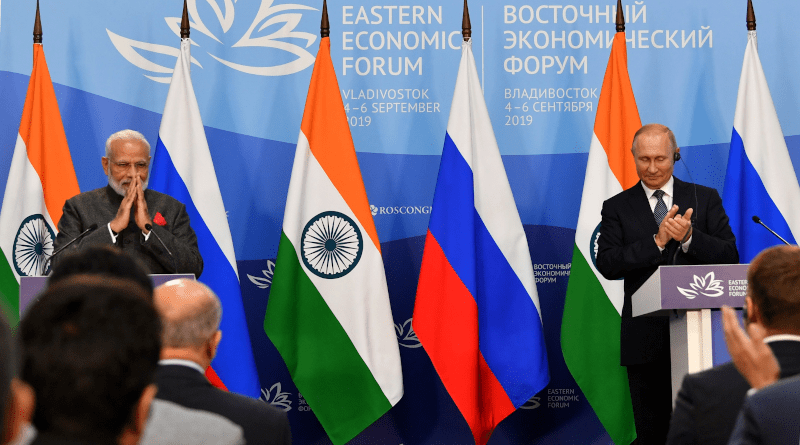India And Russia Alliance Tested By Modern Challenges – OpEd
Russia and India have a long and important relationship that lasted for many years. They have worked together in different fields including economics, strategy, and diplomacy. The two countries share a history and respect for each other, which has led to strong cooperation in defense, energy, technology, and culture. As major powers in their region, Russia and India have worked together to face challenges and achieve common goals. Both of them support each other stances at international forums.
After the Russian invasion of Ukraine in February 2020 it has led to some tensions and complexities in their interactions. India being a closer partner with Russia has to balance its relation with other global powers, who opposed the Russian invasion of Ukraine. Many of the world’s democracies condemn Russian aggression but India being the largest democratic country did not condemn Russian aggression and refused to denounce its longtime partner. There is a statement spoken by Indian Prime Minister Narendra Modi to Russian President Vladimir Putin that “today’s era is not of war”. This statement is viewed by some analysts as India not supporting Russian aggression and criticizing Russia’s policy on this crisis but reality is different from it as this statement was said in the concern about rising food and energy prices.
Another such event that gets the attention of many and was interpreted wrong is that India is keeping itself distance from Russia by canceling several agreed purchases of Russian weapons such as MiG-29, but that decision has less to do with cutting defense agreements with Russia. This step was merely taken to boast and develop their own domestic arms production. If they wanted to far off themselves from Russia why they have not canceled the supply of other major Russian weapons and defense systems such as S-400 air defense, stealth frigates, and nuclear submarines. In reality, they cannot distance themselves from Russia as it serves an important role in Indian geopolitical calculations, supports much of India’s military arsenals, and remain popular among Indian political Elites.
Another factor that highlights that India will not move away from its strategic partner is after the Russian invasion of Ukraine. There was a supply shock to the servicing of India’s military largely Russian arsenals by limiting and delaying access to spare parts and upgrades. However, India did not take any immediate measures to advance the diversification of its military equipment by cutting off its use of Russian material and purchasing replacements. Although this delay in the supply of armaments concerned them about their access to space parts they did not plan to readily overtake its Russian weapons systems by turning to alternative foreign suppliers because Indian strategists believe that they easily managed with it with relative stability and peace at the border. In the meantime India is working on developing its domestic production of military equipment side by side they are working with Russia to fulfill outstanding military equipment and also selectively pursue contracts and agreements with Western defense companies.
Even it is the goal of India to diversify its armaments and achieve self-sufficiency over the next 20 years. They will still need Russia for the supply of several critical technologies such as India’s Sukhai-30 fighter aircraft, which remains the backbone of the Indian air force for decades, cannot be managed, maintained, or upgraded without significant Russian contributions
Besides the need for material things. Some shared ideology will keep both countries together and they have to main maintain friendly relationships. Both countries’ officials support the “polycentric” vision of global order, in which no single hegemon exists which maintains power and influences decisions all over the world. Both countries believe that such international order is stable where two or more two superpowers exist.
On some aspects, India did side with the West on some procedural votes at United Nations such as the one to allow Ukrainian President Volodymyr Zelensky to address the UN general assembly. But most of the time they have supported the stance of Russia at international forums.
Indian political elites also maintain a high degree of harmony for Russia rooted in decades of cooperation with the Soviet Union. Two months after the Russian invasion. An Indian foreign policy scholar, Yoga Jyotsna, suggested that in the opinion of members of “armed forces and perceptive analysis, Russia stands number one as India’s friend”. These statements show that India will continue to remain a strategic partner with Russia. Political elites as well as the public of India also sympathize with Russia as said by Rajeswari Rajagopalan, a director at a major Indian think tank that “the strategic sympathy for the Soviets and Russia continues not just among the political class but also among the larger public” because of the historic Russian support for India.
Thus keeping in mind the shared Ideology, the need for military equipment, and the opinion and sympathy of the public towards Russia. Indian policymakers must formulate such a foreign policy towards Russia which aims to strengthen the bond between both countries.

